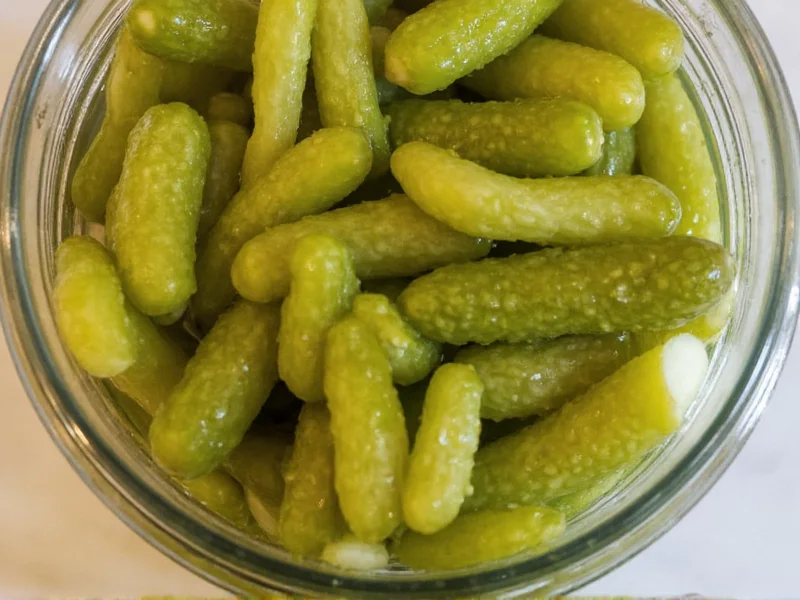When you reach for a jar of Vlasic pickles, you're getting cucumbers preserved through a vinegar-based process, not traditional fermentation. This distinction matters for both taste preferences and health considerations. Understanding how your favorite pickles are made helps you make informed choices about what you're consuming.
What Makes a Pickle "Fermented"?
True fermented pickles undergo lacto-fermentation, a natural preservation process where cucumbers sit in a saltwater brine. Beneficial bacteria convert natural sugars into lactic acid, which preserves the cucumbers and creates that distinctive tangy flavor. This process typically takes several weeks and produces probiotics that support gut health.
Vlasic's Production Process Explained
Vlasic uses what's called "fresh pack" or "quick process" pickling. Their method involves:
- Submerging cucumbers in a vinegar-based solution immediately after harvest
- Adding precise measurements of vinegar, salt, and spices
- Using heat processing to seal the jars and ensure shelf stability
- Completing the process in days rather than weeks
This modern technique creates consistent flavor and texture across batches, which explains Vlasic's reliable taste profile. The vinegar provides immediate acidity that preserves the cucumbers without requiring bacterial fermentation.
Fermented vs. Vinegar-Based Pickles: Key Differences
| Characteristic | Fermented Pickles | Vinegar-Based Pickles (Like Vlasic) |
|---|---|---|
| Production Time | 2-6 weeks | Days |
| Primary Preservative | Lactic acid (from natural fermentation) | Vinegar (acetic acid) |
| Probiotic Content | Yes, live beneficial bacteria | No probiotics |
| Flavor Development | Evolves over time, complex tanginess | Immediate, consistent flavor |
| Texture | May soften slightly during fermentation | Crisp texture maintained |
| Refrigeration Required | Yes, after fermentation completes | No, shelf-stable until opened |
Why Vlasic Chooses Vinegar Processing
Vlasic's vinegar-based method serves several practical purposes for a major commercial brand. The quick process allows for year-round production without seasonal limitations. It creates consistent flavor that customers expect from batch to batch. The shelf-stable nature means products can be distributed widely without refrigeration requirements. And the crisp texture remains reliable throughout the product's shelf life.
How to Identify Fermented Pickles When Shopping
If you're specifically seeking fermented pickles with probiotic benefits, check labels carefully. Look for phrases like "naturally fermented," "lacto-fermented," or "contains live cultures." These products will typically require refrigeration even before opening. Brands specializing in fermented foods like Bubbies, Clausen, or locally made artisanal pickles often use traditional fermentation methods. You'll usually find them in the refrigerated section rather than the shelf-stable pickle aisle.
Health Considerations: Fermented vs. Vinegar Pickles
While both types offer low-calorie snacking options, fermented pickles provide additional potential benefits. The live cultures in traditionally fermented pickles may support digestive health, though research is ongoing. Vinegar-based pickles like Vlasic still contain vinegar's potential benefits, including blood sugar regulation properties. Both types are high in sodium, so moderation matters regardless of production method. Neither type contains significant vitamins or minerals beyond what's naturally present in cucumbers.
Can You Tell the Difference by Taste?
Yes, experienced pickle enthusiasts can usually distinguish between fermented and vinegar-based varieties. Fermented pickles develop a more complex, evolving tanginess that can vary slightly between batches. Vinegar-based pickles like Vlasic deliver an immediate, consistent sharpness from the acetic acid. The texture also differs slightly, with fermented pickles sometimes having a less rigid crunch as the natural fermentation process affects cell structure.
What About Vlasic's "Refrigerator" Pickles?
Even Vlasic's refrigerator pickles use a vinegar-based process. Despite being sold in the refrigerated section, these products still rely on vinegar for preservation rather than natural fermentation. The refrigeration simply extends freshness after opening. This common misconception leads many consumers to believe refrigerator pickles are fermented when they're typically just vinegar-based pickles with a shorter shelf life after opening.
Finding Truly Fermented Pickle Alternatives
If you're looking for genuinely fermented pickles, seek out products explicitly labeled as such. Many farmers' markets feature locally made fermented pickles using traditional methods. Some grocery stores carry specialty brands like Wildbrine or Farmhouse Culture in their refrigerated sections. You can also make your own fermented pickles at home with just cucumbers, water, salt, and time—no vinegar required. These homemade versions allow complete control over ingredients and fermentation duration.
Are any Vlasic pickle varieties fermented?
No, none of Vlasic's commercial pickle varieties use traditional fermentation. All Vlasic products, including their kosher dills, bread and butter pickles, and refrigerator pickles, are made with a vinegar-based preservation process rather than lacto-fermentation.
Why don't major brands like Vlasic use fermentation?
Large-scale commercial brands avoid traditional fermentation because it's less predictable, takes longer, and requires more space. Vinegar processing allows for consistent flavor, faster production, shelf stability, and easier quality control across massive production volumes—essential for nationwide distribution.
Do fermented pickles taste different from Vlasic?
Yes, fermented pickles develop a more complex, evolving tanginess compared to the immediate sharpness of vinegar-based pickles like Vlasic. Fermented varieties often have a slightly less rigid crunch and their flavor continues developing in the jar, while Vlasic's flavor remains consistent from first bite to last.
Are fermented pickles healthier than Vlasic pickles?
Fermented pickles contain live probiotics that may support gut health, which Vlasic's vinegar-based pickles lack. However, both types are high in sodium and low in calories. Vinegar in Vlasic pickles offers some potential health benefits too. Neither provides significant vitamins, so the health difference primarily relates to the presence of probiotics in traditionally fermented varieties.
How can I tell if pickles are fermented when shopping?
Look for labels stating "naturally fermented," "lacto-fermented," or "contains live cultures." Truly fermented pickles require refrigeration even before opening, so find them in the refrigerated section. Avoid products listing vinegar as an ingredient if you want traditional fermentation. Artisanal or locally made pickles are more likely to be fermented than major commercial brands.











 浙公网安备
33010002000092号
浙公网安备
33010002000092号 浙B2-20120091-4
浙B2-20120091-4